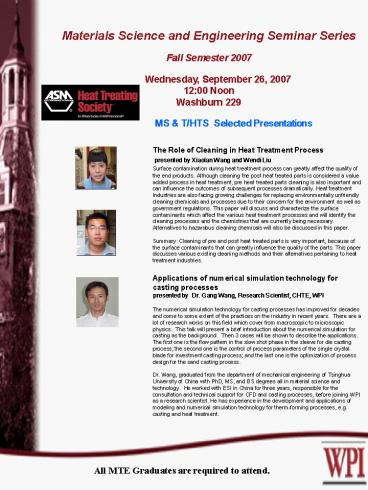Materials Science and Engineering Seminar Series - PowerPoint PPT Presentation
1 / 1
Title:
Materials Science and Engineering Seminar Series
Description:
The first one is the flow pattern in the slow shot phase in the sleeve for die ... He worked with ESI in China for three years, responsible for the consultation ... – PowerPoint PPT presentation
Number of Views:48
Avg rating:3.0/5.0
Title: Materials Science and Engineering Seminar Series
1
Materials Science and Engineering Seminar
Series Fall Semester 2007 Wednesday, September
26, 2007 1200 Noon Washburn 229 MS T/HTS
Selected Presentations The Role of
Cleaning in Heat Treatment Process presented
by Xiaolan Wang and Wendi Liu Surface
contamination during heat treatment process can
greatly affect the quality of the end products.
Although cleaning the post heat treated parts is
considered a value added process in heat
treatment, pre heat treated parts cleaning is
also important and can influence the outcomes
of subsequent processes dramatically. Heat
treatment Industries are also facing growing
challenges for replacing environmentally
unfriendly cleaning chemicals and processes due
to their concern for the environment as well as
government regulations. This paper will discuss
and characterize the surface contaminants
which affect the various heat treatment processes
and will identify the cleaning processes and
the chemistries that are currently being
necessary. Alternatives to hazardous cleaning
chemicals will also be discussed in this
paper. Summary Cleaning of pre and post
heat treated parts is very important, because of
the surface contaminants that can greatly
influence the quality of the parts. This paper
discusses various existing cleaning methods and
their alternatives pertaining to heat treatment
industries. Applications of numerical
simulation technology for casting
processes presented by Dr. Gang Wang, Research
Scientist, CHTE, WPI The numerical simulation
technology for casting processes has improved for
decades and come to some extent of the practices
on the industry in recent years. There are a lot
of research works on this field which cover from
macroscopic to microscopic physics. This talk
will present a brief introduction about the
numerical simulation for casting as the
background. Then 3 cases will be shown to
describe the applications. The first one is the
flow pattern in the slow shot phase in the sleeve
for die casting process the second one is the
control of process parameters of the single
crystal blade for investment casting process and
the last one is the optimization of process
design for the sand casting process. Dr. Wang,
graduated from the department of mechanical
engineering of Tsinghua University of China with
PhD, MS, and BS degrees all in material science
and technology. He worked with ESI in China for
three years, responsible for the consultation and
technical support for CFD and casting processes,
before joining WPI as a research scientist. He
has experience in the development and
applications of modeling and numerical simulation
technology for therm-forming processes, e.g.
casting and heat treatment.































